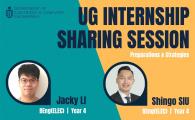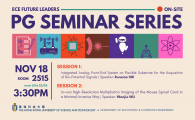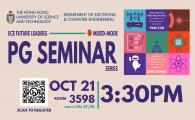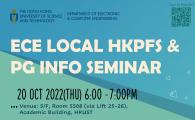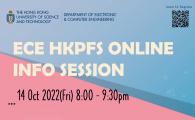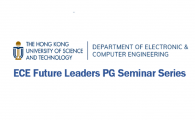研討會, 演講, 講座
社交聚會
由 電子及計算機工程學系; ECE Alumni Association 主辦
LT-C
2023 年 2 月 11 日
簡介會, 迎新
研討會, 演講, 講座
社交聚會
遊覽, 參觀
由 電子及計算機工程學系 主辦
2023 年 2 月 4 日
研討會, 演講, 講座
由 電子及計算機工程學系; IEEE Magnetics Society HK Chapter 主辦
Meeting ID : 914 2215 8408, Passcode : 300968
2023 年 1 月 13 日
研討會, 演講, 講座
由 電子及計算機工程學系 主辦
Room 5560 (lift 27/28), Academic Bldg.
2022 年 12 月 21 日
研討會, 演講, 講座
由 電子及計算機工程學系 主辦
ECE Conference room 2515-2516 (2/F via lifts 25/26)
2022 年 12 月 12 日
研討會, 演講, 講座
由 電子及計算機工程學系 主辦
Rm 1401, 1/F, Academic Building
2022 年 12 月 8 日
研討會, 演講, 講座
由 電子及計算機工程學系 主辦
Rm 1401, 1/F, Academic Building
2022 年 12 月 8 日
研討會, 演講, 講座
由 電子及計算機工程學系 主辦
LT-A Lecture Theater
2022 年 11 月 29 日
研討會, 演講, 講座
由 電子及計算機工程學系 代表 The Electronic and Computer Engineering Alumni Association 推廣
Online Video Conference (Access link will be provided upon registration)
2022 年 11 月 26 日
研討會, 演講, 講座
由 電子及計算機工程學系 主辦
Room 2515-2516, Academic Building (near Lifts 25-26)
2022 年 11 月 18 日
研討會, 演講, 講座
由 電子及計算機工程學系 主辦
ECE conference room 2515-2516 (2/F via lifts 25/26), HKUST
2022 年 11 月 9 日
研討會, 演講, 講座
由 電子及計算機工程學系 主辦
Room 2405, Academic Building (near Lifts 17-18)
2022 年 10 月 21 日
研討會, 演講, 講座
由 電子及計算機工程學系 主辦
5/F, Room 5508 (via Lift 25-26), Academic Building
2022 年 10 月 20 日
研討會, 演講, 講座
由 電子及計算機工程學系; SID and SKL 主辦
CYT G002
2022 年 10 月 14 日
研討會, 演講, 講座
由 電子及計算機工程學系 主辦
Zoom ID: 927 7056 6891; Passcode: 470290
2022 年 10 月 14 日
研討會, 演講, 講座
由 電子及計算機工程學系 主辦
Room 1103 (lift 25/26), Academic Bldg.
2022 年 9 月 29 日
研討會, 演講, 講座
由 電子及計算機工程學系 主辦
Lecture Theatre-H (LT-H), Academic Building
2022 年 9 月 15 日
工作坊
由 電子及計算機工程學系; Huawei 主辦
Online via Zoom (Register is required)
2022 年 9 月 15 日 至 2022 年 9 月 16 日






